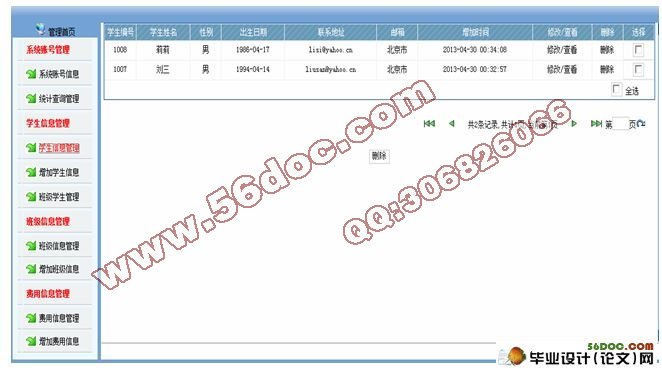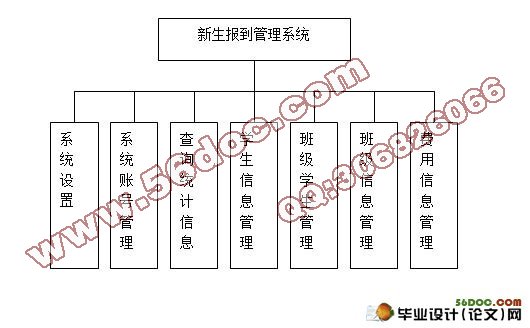基于BS结构的新生报道系统管理设计与实现(含录像)
无需注册登录,支付后按照提示操作即可获取该资料.
基于BS结构的新生报道系统管理设计与实现(含录像)(Myeclipse)(毕业论文8500字,答辩PPT,程序代码,数据库)
摘 要
新生报到管理系统是一个教育单位不可缺少的部分,一直以来人们使用传统人工的方式管理文件档案,这种管理方式存在着许多缺点,如:效率低、保密性差,另外时间一长,将产生大量的文件和数据,这对于查找、更新和维护都带来了不少的困难。
本系统采用的是JSP和SQL SERVER开发,Windows XP Professional操作系统,采用JDBC方式与后台数据库进行连接,完成数据的添加、修改、删除、查询等功能。本系统为用户提供强大的数据操纵功能,界面友好、使用简单方便,同时基于B/S模式。
关键词: B/S;JSP;Microsoft SQL Server 2000;MIS;新生报到管理系统
Abstract
The newborn registration management system management system is an education unit essential part, since the people have used the traditional artificial way management document file, this mode of administration has many shortcomings, for example: The efficiency is low, the secrecy is bad, as soon as moreover the time is long, will produce the massive documents and the data, this regarding the search, the renewal and the maintenance has brought many difficulties.what this system uses is JSP and SQL the SERVER development, Windows XP the Professional operating system, selects the JDBC method and the backstage database carries on the connection, completes functions and so on data increase, revision, deletion, inquiry. This system provides the formidable data operation function for the user, the contact surface is friendly, use simple convenient, simultaneously based on the B/S pattern. key word: B/S; JSP; Microsoft SQL Server 2000; MIS; Newborn registration management system management system
Key words:B/S; JSP; Microsoft SQL Server 2000; MIS;
Newborn registration management system


目 录
摘 要 II
Abstract 3
第1章 前 言 4
1.1 开发背景 4
1.2 开发意义 4
1.3 内容简介 4
1.4开发工具选择 5
1.5开发工具 5
1.5.1 JSP的优势 5
1.5.2 JSP的特点 6
第2章 系统分析 7
2.1新生报到管理功能介绍 7
2.1.1 功能描述 7
2.1.2 产品功能 7
2.2 新生报到管理系统可行性分析 8
2.2.1 经济可行性 8
2.2.2 技术可行性 8
2.2.3 运行可行性 8
第3章 系统总体设计 9
3.1 系统功能介绍 9
3.2 数据库设计 9
第4章 系统详细设计 11
4.1 处理流程设计 11
4.1.1 系统操作流程 11
4.1.2 数据增加流程 12
4.1.3 数据修改流程 12
4.1.4 数据删除流程 13
4.2 E-R图 14
4.3 系统界面设计及代码设计 15
4.3.1 管理员登陆 15
4.3.2 学生信息管理 16
4.3.3 班级信息管理 18
第5章 系统调试与测试 20
5.1 程序调试 20
5.2 程序的测试 20
5.2.1 测试的重要性及目的 20
5.2.2 测试的步骤 22
5.2.3 测试的主要内容 22
第6章 结论 24
6.1 系统评价 24
6.2 安全性问题 24
致谢 26
参考文献 27
